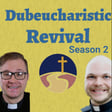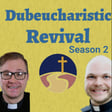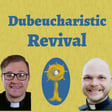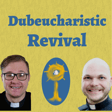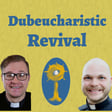
14: Converts to the Real - with Dr. Travis Lacey
St. Edith Stein, Catholic Theologian, Philosopher, Confessor, Virgin, and Martyr is the subject of this episode. Dr. Lacey will guide us through not only her works on phenomenology, the nature of humanity and truth, and womanhood, but also her deep and profound love for her Catholic faith and Jesus in the Eucharist.
Notable dates, names, and published texts are written in the order in which they are mentioned:
-October 12th 1891: Born
From the age of seven she had “a ready intelligence, an iron will, a strong sense of duty, and a natural desire to help.”
Edmund Husserl, the founder of phenomenology
“The Logical Investigations” by Edmund Husserl (1900)
Famous early phenomenologists and Catholics: Max Scheler and Deitrich von Hildebrand
“We were made to be enchanted by the real…we are made to commune and know the Truth.”
“On the Problem of Empathy” by Edith Stien (1916)
January 1st 1922: Baptized and Confirmed and greatly desired to enter the Carmelites
Erich Przywara SJ, introduced her to the writings of John Henry Newman and St Thomas Aquinas
“The Idea of the University” by St. John Henry Newman (1852)
Abbot Walzer, OSB was her spiritual director.
1923-1931 Attending liturgy at Benedictine Abby, teaching at a Dominican girls school, and being invited to speak on a lecture circuit
“Woman” by Edith Stein (1933)
1933 the National Socialist Party won a majority rule in parliament and Adolf Hitler was made chancellor.
October 13th 1933 Edith enters the Carmelite order
April 15th 1934 “Clothing Day”
“Finite and Eternal Being: An Attempt at an Ascent to the Meaning of Being” by Edith Stein (1936)
“The Science of the Cross” by Edith Stein (published in 1950)
September 1st, 1939 WWII Starts
August 9, 1942 (age 50 years) death and Feast day: Auschwitz extermination camp, Oświęcim, Poland
Teresa Benedicta of the Cross:
-Teresa of Avila and Thérèse of Lisieux (both Carmelites)
-Benedicta: honors her Benedictine influence and the name itself means “blessed”
-“of the Cross” is a reference to St. John of the Cross.
“We need to make the Eucharistic Truths become effective within us." - Edith Stien
“Stein is convinced that the sacrifice of the Eucharist is really the icon, the model, the radiant image, or what all human acts of knowing and love must be like.” - Dr. Travis Lacey
"Eucharistische Erziehung" (Eucharistic Education, 1926) not yet published in English
“The Eucharist is the most pedagogical of all acts.” - Edith Stein
“The great wisdom of phenomenology is this: the world is more interesting than you normally think that it is. If you pay attention, its depths will become manifest to you. But not only it’s depths, but your depths too.” Dr. Travis Lacey
